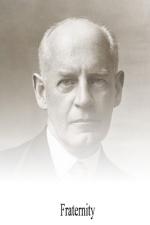In that little sentence lay the whole psychology of his attitude towards this situation and all the difference between two classes of the population. Mr. Purcey would undoubtedly have said: “Well, I’m damned!” Stephen, by saying “No, I’m damned!” betrayed that before he could be damned he had been obliged to wrestle and contend with something, and Cecilia, who was always wrestling too, knew this something to be that queer new thing, a Social Conscience, the dim bogey stalking pale about the houses of those who, through the accidents of leisure or of culture, had once left the door open to the suspicion: Is it possible that there is a class of people besides my own, or am I dreaming? Happy the millions, poor or rich, not yet condemned to watch the wistful visiting or hear the husky mutter of that ghost, happy in their homes, blessed by a less disquieting god. Such were Cecilia’s inner feelings.
Even now she did not quite plumb the depths of Stephen’s; she felt his struggle with the ghost; she felt and admired his victory. What she did not, could not, perhaps, realise, was the precise nature of the outrage inflicted on him by Thyme’s action. With her—being a woman—the matter was more practical; she did not grasp, had never grasped, the architectural nature of Stephen’s mind—how really hurt he was by what did not seem to him in due and proper order.
He spoke: “Why on earth, if she felt like that, couldn’t she have gone to work in the ordinary way? She could have put herself in connection with some proper charitable society—I should never have objected to that. It’s all that young Sanitary idiot!”
“I believe,” Cecilia faltered, “that Martin’s is a society. It’s a kind of medical Socialism, or something of that sort. He has tremendous faith in it.”
Stephen’s lip curled.
“He may have as much faith as he likes,” he said, with the restraint that was one of his best qualities, “so long as he doesn’t infect my daughter with it.”
Cecilia said suddenly: “Oh! what are we to do, Stephen? Shall I go over there to-night?”
As one may see a shadow pass down on a cornfield, so came the cloud on Stephen’s face. It was as though he had not realised till then the full extent of what this meant. For a minute he was silent. “Better wait for her letter,” he said at last. “He’s her cousin, after all, and Mrs. Grundy’s dead—in the Euston Road, at all events.”
So, trying to spare each other all they could of anxiety, and careful to abstain from any hint of trouble before the servants, they dined and went to bed.
At that hour between the night and morning, when man’s vitality is lowest, and the tremors of his spirit, like birds of ill omen, fly round and round him, beating their long plumes against his cheeks, Stephen woke.




